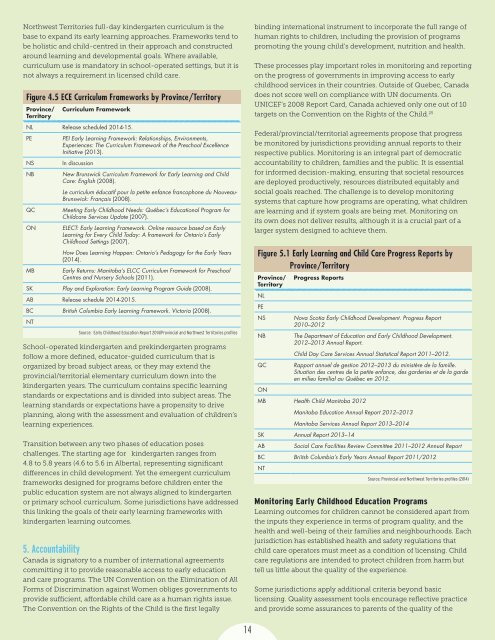early-childhood-education-report2014-eng
early-childhood-education-report2014-eng
early-childhood-education-report2014-eng
You also want an ePaper? Increase the reach of your titles
YUMPU automatically turns print PDFs into web optimized ePapers that Google loves.
Northwest Territories full-day kindergarten curriculum is the<br />
base to expand its <strong>early</strong> learning approaches. Frameworks tend to<br />
be holistic and child-centred in their approach and constructed<br />
around learning and developmental goals. Where available,<br />
curriculum use is mandatory in school-operated settings, but it is<br />
not always a requirement in licensed child care.<br />
Figure 4.5 ECE Curriculum Frameworks by Province/Territory<br />
Province/<br />
Territory<br />
Curriculum Framework<br />
NL Release scheduled 2014-15.<br />
PE<br />
NS<br />
NB<br />
QC<br />
ON<br />
MB<br />
PEI Early Learning Framework: Relationships, Environments,<br />
Experiences: The Curriculum Framework of the Preschool Excellence<br />
Initiative (2013).<br />
In discussion<br />
New Brunswick Curriculum Framework for Early Learning and Child<br />
Care: English (2008).<br />
Le curriculum éducatif pour la petite enfance francophone du Nouveau-<br />
Brunswick: Français (2008).<br />
Meeting Early Childhood Needs: Québec’s Educational Program for<br />
Childcare Services Update (2007).<br />
ELECT: Early Learning Framework. Online resource based on Early<br />
Learning for Every Child Today: A framework for Ontario’s Early<br />
Childhood Settings (2007).<br />
How Does Learning Happen: Ontario’s Pedagogy for the Early Years<br />
(2014).<br />
Early Returns: Manitoba’s ELCC Curriculum Framework for Preschool<br />
Centres and Nursery Schools (2011).<br />
SK Play and Exploration: Early Learning Program Guide (2008).<br />
AB Release schedule 2014-2015.<br />
BC British Columbia Early Learning Framework. Victoria (2008).<br />
NT<br />
Source: Early Childhood Education Report 2014/Provincial and Northwest Territories profiles<br />
School-operated kindergarten and prekindergarten programs<br />
follow a more defined, educator-guided curriculum that is<br />
organized by broad subject areas, or they may extend the<br />
provincial/territorial elementary curriculum down into the<br />
kindergarten years. The curriculum contains specific learning<br />
standards or expectations and is divided into subject areas. The<br />
learning standards or expectations have a propensity to drive<br />
planning, along with the assessment and evaluation of children’s<br />
learning experiences.<br />
Transition between any two phases of <strong>education</strong> poses<br />
chall<strong>eng</strong>es. The starting age for kindergarten ranges from<br />
4.8 to 5.8 years (4.6 to 5.6 in Alberta), representing significant<br />
differences in child development. Yet the emergent curriculum<br />
frameworks designed for programs before children enter the<br />
public <strong>education</strong> system are not always aligned to kindergarten<br />
or primary school curriculum. Some jurisdictions have addressed<br />
this linking the goals of their <strong>early</strong> learning frameworks with<br />
kindergarten learning outcomes.<br />
5. Accountability<br />
Canada is signatory to a number of international agreements<br />
committing it to provide reasonable access to <strong>early</strong> <strong>education</strong><br />
and care programs. The UN Convention on the Elimination of All<br />
Forms of Discrimination against Women obliges governments to<br />
provide sufficient, affordable child care as a human rights issue.<br />
The Convention on the Rights of the Child is the first legally<br />
binding international instrument to incorporate the full range of<br />
human rights to children, including the provision of programs<br />
promoting the young child’s development, nutrition and health.<br />
These processes play important roles in monitoring and reporting<br />
on the progress of governments in improving access to <strong>early</strong><br />
<strong>childhood</strong> services in their countries. Outside of Quebec, Canada<br />
does not score well on compliance with UN documents. On<br />
UNICEF’s 2008 Report Card, Canada achieved only one out of 10<br />
targets on the Convention on the Rights of the Child. 25<br />
Federal/provincial/territorial agreements propose that progress<br />
be monitored by jurisdictions providing annual reports to their<br />
respective publics. Monitoring is an integral part of democratic<br />
accountability to children, families and the public. It is essential<br />
for informed decision-making, ensuring that societal resources<br />
are deployed productively, resources distributed equitably and<br />
social goals reached. The chall<strong>eng</strong>e is to develop monitoring<br />
systems that capture how programs are operating, what children<br />
are learning and if system goals are being met. Monitoring on<br />
its own does not deliver results, although it is a crucial part of a<br />
larger system designed to achieve them.<br />
Figure 5.1 Early Learning and Child Care Progress Reports by<br />
Province/Territory<br />
Province/<br />
Territory<br />
NL<br />
PE<br />
NS<br />
NB<br />
QC<br />
Progress Reports<br />
Nova Scotia Early Childhood Development. Progress Report<br />
2010–2012<br />
The Department of Education and Early Childhood Development.<br />
2012–2013 Annual Report.<br />
Child Day Care Services Annual Statistical Report 2011–2012.<br />
Rapport annuel de gestion 2012–2013 du ministère de la famille.<br />
Situation des centres de la petite enfance, des garderies et de la garde<br />
en milieu familial au Québec en 2012.<br />
ON<br />
MB Health Child Manitoba 2012<br />
Manitoba Education Annual Report 2012–2013<br />
Manitoba Services Annual Report 2013–2014<br />
SK Annual Report 2013–14<br />
AB<br />
Social Care Facilities Review Committee 2011–2012 Annual Report<br />
BC Briitsh Columbia’s Early Years Annual Report 2011/2012<br />
NT<br />
Source: Provincial and Northwest Territories profiles (2014)<br />
Monitoring Early Childhood Education Programs<br />
Learning outcomes for children cannot be considered apart from<br />
the inputs they experience in terms of program quality, and the<br />
health and well-being of their families and neighbourhoods. Each<br />
jurisdiction has established health and safety regulations that<br />
child care operators must meet as a condition of licensing. Child<br />
care regulations are intended to protect children from harm but<br />
tell us little about the quality of the experience.<br />
Some jurisdictions apply additional criteria beyond basic<br />
licensing. Quality assessment tools encourage reflective practice<br />
and provide some assurances to parents of the quality of the<br />
14


